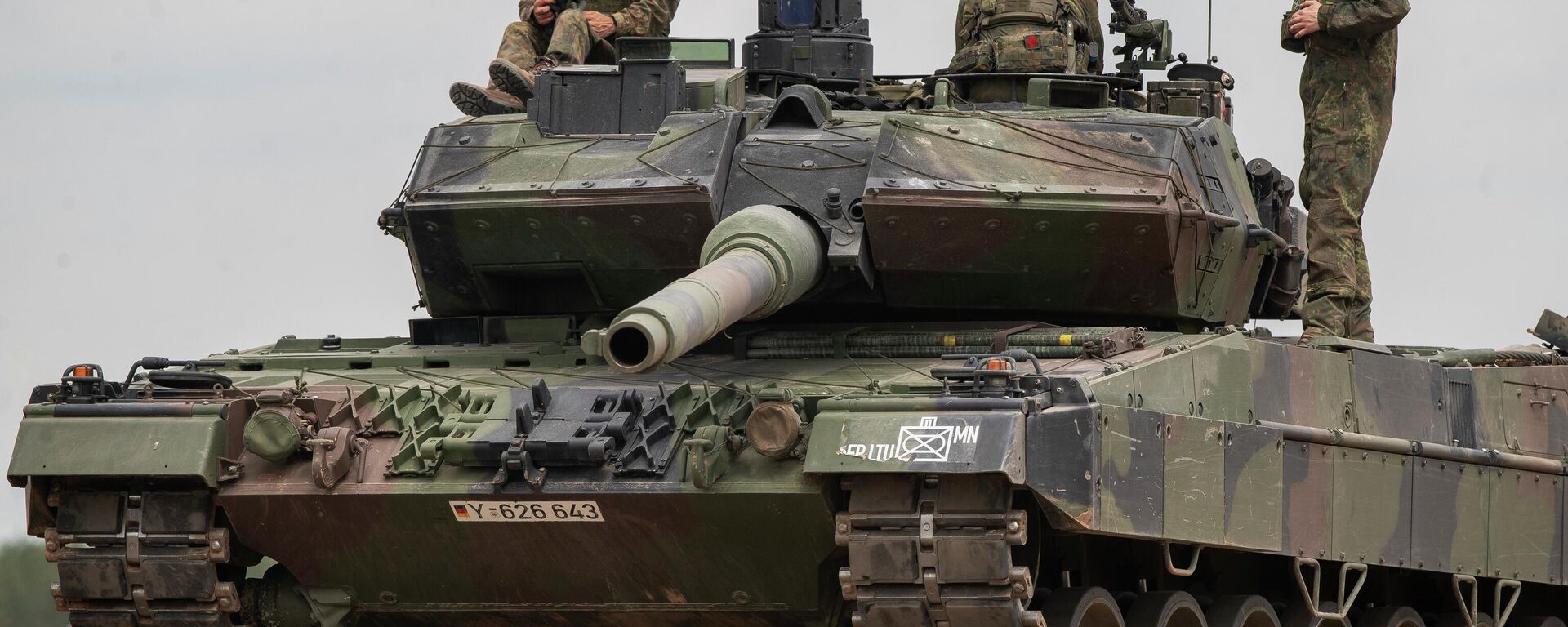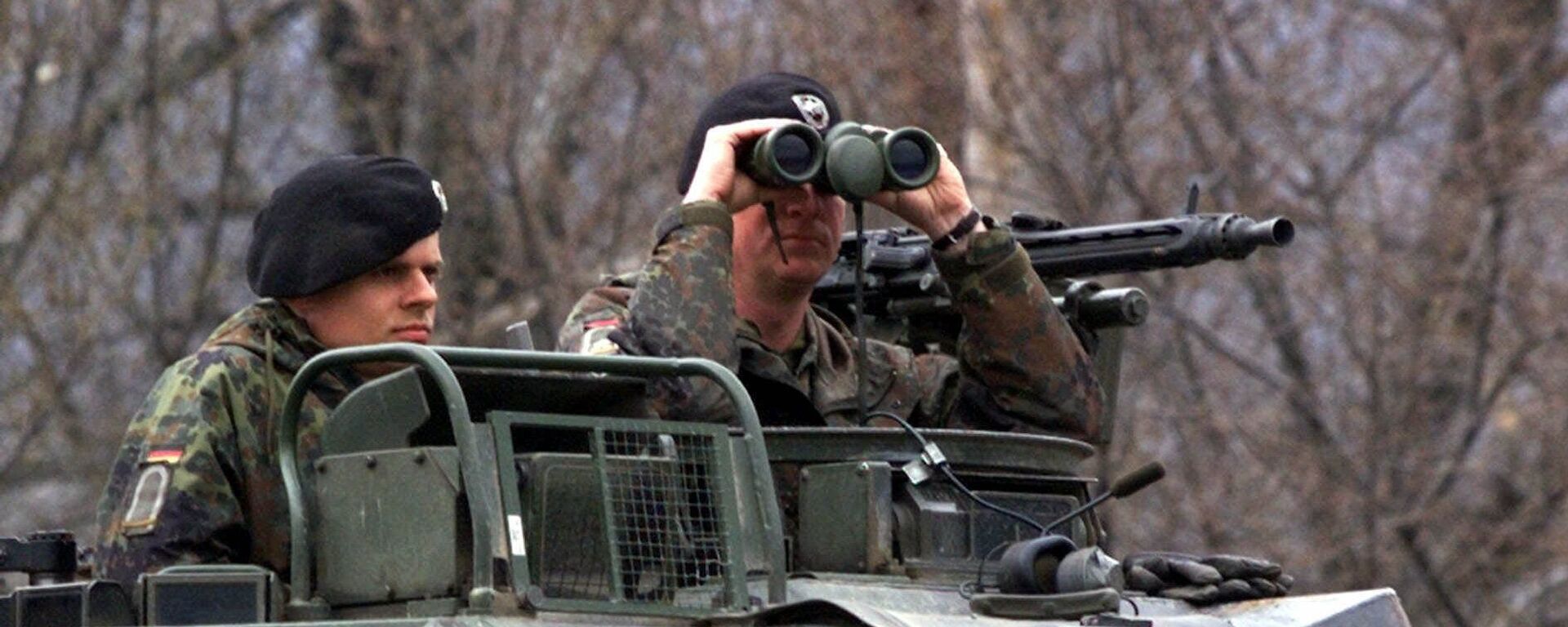https://sputnikglobe.com/20231208/german-media-blasts-berlins-plans-to-send-brigade-on-broomsticks-to-russias-doorstep-1115479843.html
German Media Blasts Berlin's Plans to Send 'Brigade With Broomsticks' to Russia's Doorstep
German Media Blasts Berlin's Plans to Send 'Brigade With Broomsticks' to Russia's Doorstep
Sputnik International
Berlin has been by far the biggest donor of ammunition and military equipment to Ukraine for NATO’s proxy war against Russia besides the United States, to the Bundeswehr’s detriment. Last month, German media reported that the nation’s military currently has the resources to last a “maximum” of 48 hours if Germany ever faced a hot war.
2023-12-08T14:14+0000
2023-12-08T14:14+0000
2023-12-08T19:41+0000
world
boris pistorius
germany
ukraine
berlin
bundeswehr
nato
bundestag
https://cdn1.img.sputnikglobe.com/img/07e7/0c/08/1115479389_0:160:3072:1888_1920x0_80_0_0_2a8d469b7d2f22ef4cc2c5b5bcb1a4d7.jpg
German media has savaged Defense Minister Boris Pistorius’s plans to station a German Army brigade in Lithuania to “contain Russia,” suggesting that “basic arithmetic” shows such plans to be infeasible.Pistorius announced plans to deploy a 4,000-strong brigade of troops in the Baltic nation in September, saying the move, designed to show “solidarity and responsibility in the east wing [of NATO]” should be created by the end of 2024.“This is unprecedented for the German Bundeswehr. We’ve never done it like that, deploying an entire brigade overseas,” Pistorius said, noting that troops would be deployed to the east together with their families.But Berlin may have bitten off than it can chew with the deployment, according to detractors.The decision to deploy a new brigade formed from scratch rather than an an existing unit also means tens of thousands of weapons and pieces of equipment need to be bought. German opposition ridiculed the plan, saying it could mean the creation of a “panzer battalion without panzers” with soldiers armed with broomsticks instead of rifles.Bundeswehr’s WoesBetween January 2022 and October 31, 2023, Germany delivered over €17.1 billion ($18.4 billion US) in military assistance to Ukraine – more than any other NATO country besides the US. That has severely strained Germany’s ability to fight, despite warnings by Pistorius that Berlin must “get used to the idea that there may be a threat of war in Europe” and be “able to defend itself.”Germany launched an ambitious €100-billion rearmament program last year, a level of defense spending unseen since World War II. But it has so far failed to improve either its military capabilities or increase arms supplies to Ukraine.In July, Bundeswehr chief Alfons Mais complained that his army did not have the resources to assemble even a single new 20,000-strong combat-ready division, with the first of three planned new units expected to be created only by the year 2025.Germany's Ukraine-related military troubles have been accompanied by economic ones. The European Union's economic and industrial giant has slipped in and out of recession through the year, and faced the prospect of unprecedented deindustrialization as the impact of its decision to cut itself off from Russian energy supplies kicks in.Hundreds of companies big and small have already moved their production facilities abroad, with Germany’s American ‘allies’ eagerly poaching producers by offering generous tax incentives and considerably lower energy costs.
https://sputnikglobe.com/20231126/german-troops-would-only-last-two-days-in-battle-due-to-ukraine-military-supplies-1115219337.html
https://sputnikglobe.com/20231110/why-germanys-military-buildup-and-eu-leadership-remain-a-big-if-1114875013.html
germany
ukraine
berlin
Sputnik International
feedback@sputniknews.com
+74956456601
MIA „Rossiya Segodnya“
2023
News
en_EN
Sputnik International
feedback@sputniknews.com
+74956456601
MIA „Rossiya Segodnya“
Sputnik International
feedback@sputniknews.com
+74956456601
MIA „Rossiya Segodnya“
germany, lithuania, brigade, army, bundeswehr, troops, tanks, armor, difficulties
germany, lithuania, brigade, army, bundeswehr, troops, tanks, armor, difficulties
German Media Blasts Berlin's Plans to Send 'Brigade With Broomsticks' to Russia's Doorstep
14:14 GMT 08.12.2023 (Updated: 19:41 GMT 08.12.2023) Berlin has been by far the biggest donor of ammunition and military equipment to Ukraine for NATO’s proxy war against Russia after the US, to the Bundeswehr’s detriment. Last month, German media reported that the nation’s military only has enough resources to last a “maximum” of 48 hours if Germany ever faced a hot war.
German media has savaged Defense Minister Boris Pistorius’s plans to station a German Army brigade in Lithuania to “contain Russia,” suggesting that “basic arithmetic” shows such plans to be infeasible.
Pistorius announced plans to deploy a 4,000-strong brigade of troops in the Baltic nation in September, saying the move, designed to show “solidarity and responsibility in the east wing [of NATO]” should be created by the end of 2024.
“This is unprecedented for the German Bundeswehr. We’ve never done it like that, deploying an entire brigade overseas,” Pistorius said, noting that troops would be deployed to the east together with their families.
But Berlin may have bitten off than it can chew with the deployment, according to detractors.
“Anyone who’s studied basic arithmetic in school…knows that the formation of a combat brigade automatically implies additional requirements for personnel and logistics, which Germany is simply not able to fulfil at present,” Bundeswehr Colonel Andre Wustner pointed out.
The decision to deploy a new brigade formed from scratch rather than an an existing unit also means tens of thousands of weapons and pieces of equipment need to be bought. German opposition ridiculed the plan, saying it could mean the creation of a “panzer battalion without panzers” with soldiers armed with broomsticks instead of rifles.
“It will be possible to replace all the tanks sent to Ukraine only in 2026 – and that’s given the proper functioning of the military-industrial complex," said Bundestag MP Ingo Gadechens, the CDU/CSU's rapporteur on the defense budget. "Until then, personnel will be forced to operate vehicles and hone their skills on simulators. Therefore, it will be necessary to either postpone sending the brigade to Lithuania until after pigs learn to fly, or, instead of tanks, give personnel brooms as personal weapons.”
Between January 2022 and October 31, 2023, Germany delivered
over €17.1 billion ($18.4 billion US) in military assistance to Ukraine – more than any other NATO country besides the US. That has severely strained Germany’s ability to fight,
despite warnings by Pistorius that Berlin must “get used to the idea that there may be a threat of war in Europe” and be “able to defend itself.”

26 November 2023, 15:58 GMT
Germany launched an ambitious €100-billion rearmament program last year, a level of defense spending unseen since World War II. But it has so far failed to improve either its military capabilities or increase arms supplies to Ukraine.
In July, Bundeswehr chief Alfons Mais complained that his army did not have the resources to assemble even a single new 20,000-strong combat-ready division, with the first of three planned new units expected to be created only by the year 2025.
“If we rush ammunition to Ukraine, we don’t have it available for ourselves until the new orders come in. You can’t buy munitions at the DIY store, production capabilities have shrunk over the past 30 years,” the lieutenant-general said at the time.
Germany's Ukraine-related military troubles have been accompanied by economic ones. The European Union's economic and industrial giant has slipped in and out of recession through the year, and faced the prospect of unprecedented deindustrialization as the impact of its decision to cut itself off from Russian energy supplies kicks in.
Hundreds of companies big and small have already moved their production facilities abroad, with Germany’s American ‘allies’ eagerly poaching producers by offering generous tax incentives and considerably lower energy costs.

10 November 2023, 18:46 GMT




